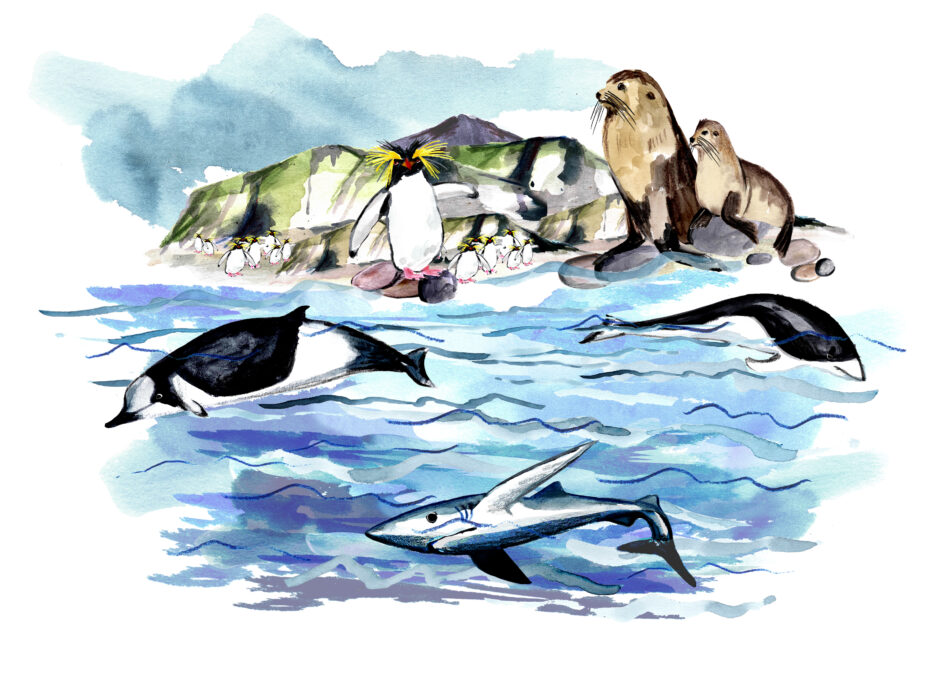Environmental Philanthropy: Stories to Inspire
Protecting one per cent of the world’s oceans
The UK and its 14 Overseas Territories (UKOTs) together have the fifth largest marine estate on the planet. Stretching from the pristine waters of the Subantarctic to vast tropical expanses in the Pacific, UKOT waters are home to iconic species such as king penguins, green turtles and humpback whales. In the face of global environmental crises, we believe these rich waters give the UK and our Overseas Territories a special responsibility and opportunity to contribute to global ocean protection.
With this in mind, in 2016 we provided a three-year, £90,000 grant to the Great British Oceans (GBO) coalition, a grouping of six UK NGOs* working with partners in the Overseas Territories to advance large-scale Marine Protected Areas (MPAs). The coalition had formed the previous year and had already had considerable success in securing Overseas Territory marine conservation commitments in political party manifestos at the 2015 general election. We were particularly impressed by their highly collaborative working relationships, sustained by weekly coalition meetings and regular visits to Overseas Territory partners. The coalition also brought together all the different strengths required, from long-term and genuine relationships with Territory conservationists to high-level political and media connections, along with a demonstrably wide base of public support. Our funding contributed towards a part-time coalition coordinator position, workshops and events, research consultancies, communications and outreach, all with the goal of turning manifesto commitments into concrete delivery for the benefit of local communities and our global oceans.
Success came swiftly: within six months the UK Government announced the start of their promised ‘Blue Belt’ policy with designations of large-scale MPAs around the Pitcairn Islands (Pacific) and St Helena (South Atlantic), along with promises to work with the local communities to create further marine protections around Ascension and Tristan da Cunha by 2019 and 2020 respectively. These protections would, if delivered, cover four million square kilometres of ocean combined – over one per cent of the world’s oceans. The Government further committed £20m over four years for scientific monitoring, management and enforcement of this new network.
The coalition’s focus throughout remained on securing large-scale designations, but we were flexible in responding to change requests. Most notably, the screening of Blue Planet II in late 2017 became a major cultural event, and the coalition ran a #BackTheBlueBelt social media campaign on the back of this. During the final episode, MPs were tweeted by members of the public every 7.5 seconds. This led to over 285 MPs from across eight political parties pledging their support to GBO’s ‘Blue Belt Charter’– the most MPs supporting any environmental cause since a campaign to pass the Climate Change Bill in 2004. It also played a vital role in the announcement of an additional 260,000 square kilometres of fully-protected waters around South Georgia and the South Sandwich Islands in 2018.
Our grant concluded in March 2019 and it has been wonderful to see this now very well-established coalition go from strength to strength. Ascension Island committed to protecting an area almost twice the size of the UK in August 2019, whilst in November 2020 the Tristan da Cunha community made a world-leading commitment to create the fourth largest fully-protected marine zone on the planet. Funding coalitions of NGOs to work with communities and governments can make wonderful, big things happen!
* Blue Marine Foundation, Greenpeace, Marine Conservation Society, Pew Charitable Trusts, Royal Society for the Protection of Birds (RSPB), Zoological Society of London (ZSL).
